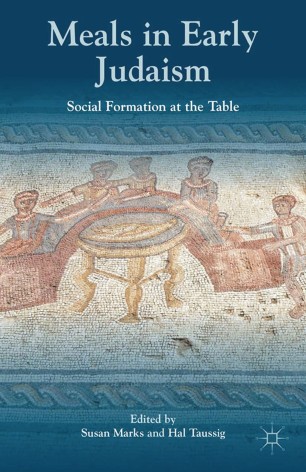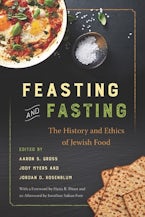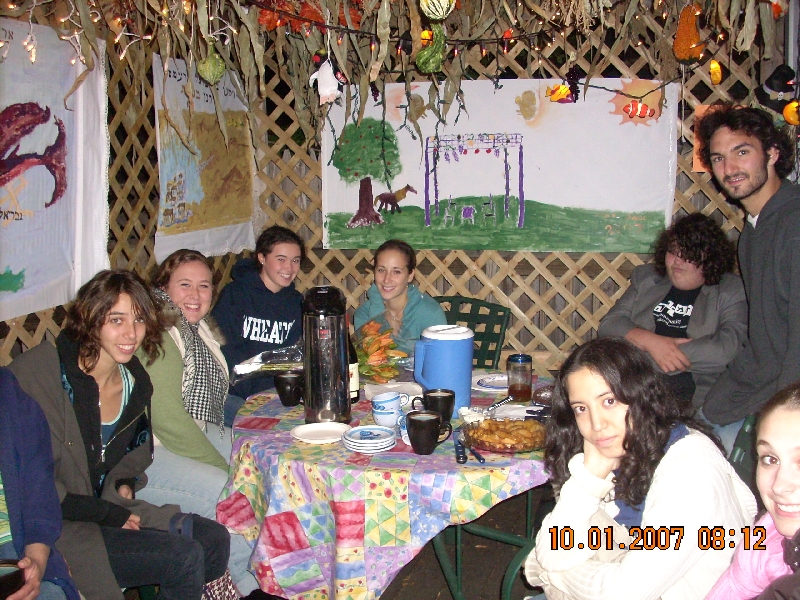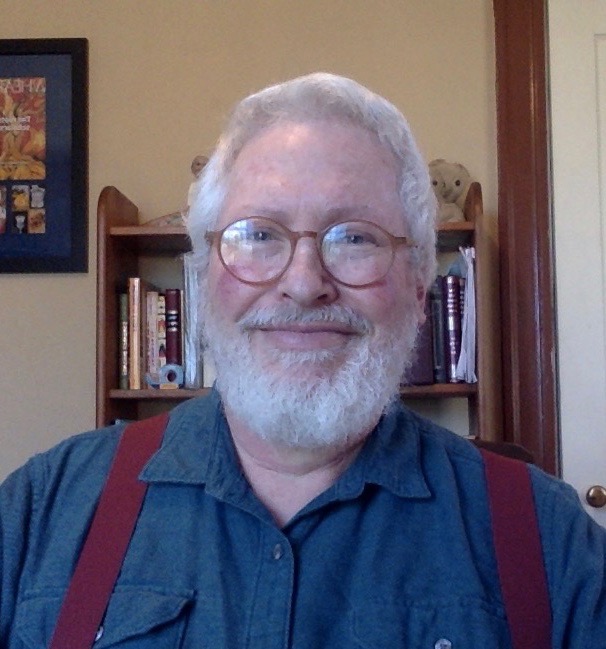Professor of Religion
History and Humanities Department
Henrietta Jennings Faculty Chair for Outstanding Teaching (2020-2025)
Program Coordinator, Jewish Studies
Network for LGBTQ+ Inclusion, Support, and Advocacy committee member
Education
Ph.D., M.A., Vanderbilt University
M.H.L., Rabbi, Reconstructionist Rabbinical College
B.A., Harvard College
About
Main Interests
Bible, Comparison of Religions, Judaism, Kabbalah and ethics, Ritual, Food and Religion (especially meal rituals), Symposium Literature, Christian-Jewish relations.
He is also the faculty advisor of Farm House and WheaFarm, Hungry Lyons, and Interfaith House, Wheaton Hillel, and a committee member of the Network for LGBTQ+ Inclusion, Support, and Advocacy.
Publications
Gastronomic Judaism as Culinary Midrash (Lexington Press/Rowman & Littlefield, October 2018).
Memorable Meals: Symposia in Luke’s Gospel, The Rabbinic Seder, and the Greco-Roman Literary Tradition, which can be accessed on-line, in which I compare early Christian table fellowship with the Jewish Passover seder.
Shulhan Shel Arba by Rabbenu Bahya Ben Asher Hlava. Translated with commentary, with illustrations by Rosemary Liss, Wheaton ’11 (2010- ) here and without the illustrations in Sefaria .
Articles and Book Chapters
-
“A Jewish Theology of Food.” In St. Andrews Encyclopaedia of Theology. Edited by Brendan N. Wolfe et al., 2024.
- “Food and Religious Rituals.” In Oxford Research Encyclopedia of Food Studies, 2024.
- “Food Rules and Rituals: Etiquette for the Cosmic Table.“ Food Rules and Rituals – Proceedings of the Oxford Symposium on Food and Cookery 2023. Equinox eBooks Publishing, United Kingdom: 40-49, 2024
- “What Am I – Chopped Suey?: Belonging and the Ambivalent Taste of American Exceptionalism,” co-authored with Zoya Brumberg. Dublin Gastronomy Symposium: Food and Movement [Proceedings], 2022.
- “Gastronomic Myths of Disruption.” Dublin Gastronomy Symposium [Proceedings], 2020.
- “The Role of Ritual in Eating,” in A Handbook of Eating and Drinking: Interdisciplinary Perspectives by Herbert Meiselman (Springer International, 2020)
- “Food in the Medieval Era,” in Feasting and Fasting: The History and Ethics of Jewish Food by Aaron Gross, Jordan Rosenblum, and Jody Myers (New York: NYU Press, 2020)
- “’Mitzvot With The Mouth:’ Medieval And Early Modern Jewish Rituals Of Eating, Reading, And Talking And Their Legacy.”Historia Religionum : An International Journal 10 (2018) 65-78.
- “What’s for Dinner in Olam Ha-ba? Why Do We Care in Olam Ha-zeh? in Olam Ha-Zeh v’olam Ha-Ba: This World and the World to Come in Jewish Belief and Practice, ed. by Leonard J Greenspoon, Studies in Jewish Civilization 28 (West Lafayette, Indiana: Purdue University Press, 2017).
- “Communicating Jewish Identity Through Taste: Jewish Flavour Principles as Culinary ‘Midrash,’” Food and Communication: Proceedings of the Oxford Symposium on Food and Cookery 2015 (Devon, UK: Prospect, 2016)
- “Contrasting Banquets: A Literary Commonplace in Philo’s On the Contemplative Life and Other Greek and Roman Symposia” in Meals in Early Judaism: Social Formation at the Table (Susan Marks and Hal Taussig, eds.; New York: Palgrave MacMillan, 2014).
- “Performing Myth, Performing Midrash at Rabbinic Meals” in Meals in Early Judaism.
- Ten Theses Concerning Meals and Early Judaism with Susan Marks and Jordan Rosenblum in Meals in the Early Judaism.
- “Cultures on Ice: Refrigeration and the Americanization of Immigrants in the First Half of the 20th Century,” co-authored with Betsey Dexter Dyer, Food and Material Culture: Proceedings of the Oxford Symposium on Food and Cookery 2013 (Devon, UK: Prospect, 2014).
- “‘Better a Meal of Vegetables with Love’: The Symbolic Meaning of Vegetables in Rabbinic and Post-Rabbinic Midrash on Proverbs 15:17,” Jewish Quarterly Review104:1 (Winter 2014) 46-56.
- “‘Bread from Heaven, Bread from the Earth:’ Recent Trends in Jewish Food History,” Writing Food History: A Global Perspective, ed. by Kyri Claflin and Peter Scholliers; London: Berg, 2012.
- “Sukkot: The Paradigmatic Harvest Festival,” Celebrations: Proceedings of the Oxford Symposium on Food and Cookery 2011, ed. by Mark McWilliams; Devon, UK: Prospect, 2012.
- “Cultures and Cultures: Fermented Foods as Culinary ‘Shibboleths,’” co-authored with Betsey Dyer, in Cured, Fermented and Smoked Foods: Proceedings of the Oxford Symposium on Food And Cookery 2010, ed. by Helen Saberi; Devon, UK: Prospect, 2011.
- “‘Truly the Ear Tests Words as the Palate Tastes Food'(Job 12:11): Synaesthetic Food Metaphors for the Experience of the Divine in Jewish Tradition,” Food and Language: Proceedings of the Oxford Symposium on Food and Cookery 2009, ed. by Richard Hosking; Devon, UK: Prospect, 2010
- “Torah on the Table: A Sensual Morality,” Food and Morality: Proceedings of the 2007 Oxford Symposium on Food and Cookery, ed. by Susan Friedland; Devon, UK: Prospect Books, 2008.
- “‘Real Eating:’ A Medieval Spanish Jewish View of Gastronomic Authenticity,”Authenticity in the Kitchen: Proceedings of the Oxford Symposium on Food & Cookery 2005, ed. by Richard Hoskings; Totnes (UK): Prospect, 2006.
- “What is Religious About Ethics?” The Reconstructionist 69:2 (2005) 49-57.
- “Does God Care What We Eat? Jewish Theologies of Food and Reverence for Life,” in Food and Judaism: Studies in Jewish Civilization 15, ed. by Leonard Greenspoon et al.; Omaha, NE: Creighton University Press, 2004.
- “Meals as Midrash: A Survey of Ancient Meals in Jewish Studies Scholarship”in Food and Judaism, 2004.
- “The Ritualization of Scripture in Rabbenu Bahya ben Asher’s Eating Manual Shulhan Shel Arba’,” Proceedings of the 13th World Congress of Jewish Studies, Jerusalem, Israel, August 2001.
- “‘Not by Bread Alone…’: Food and Drink in the Rabbinic Seder and in the Last Supper,” Semeia 86: Food and Drink in the Hebrew Bible and the New Testament, ed. by Athalya Brenner and Jan Willem van Henten (2000) 154-179.
- “Jesus as Other People’s Scripture,” The Historical Jesus Through Jewish and Catholic Eyes (ed. by Bryan F. Le Beau, Leonard Greenspoon, and Dennis Hamm; Harrisburg, PA: Trinity Press International, 2000.
- “A Jewish Ideological Perspective on the Study of Christian Scripture,” Jewish Social Studies N.S. 4:1 (1997) 121-152.
- “Meat-eating and Jewish Identity: Ritualization of the Priestly ‘Torah of Beast and Fowl’ [Lev. 11:46] in Rabbinic Judaism and in Medieval Kabbalah,”Association for Jewish Studies Review, 24/2 (1999) 227-262.
- “Contemporary Jewish Theologies: An Essay Review,” The Reconstructionist 59/1 (1994) 86-93.
- “Were the Pharisees a Conversionist Sect? Table Fellowship as a Strategy of Conversion,” “The Making of Proselytes”: Jewish Missionary Activity in the Hellenistic and Roman Worlds (ed. A.-J. Levine and R. Pervo; forthcoming), 161-192.
Papers
- “Food Rules and Rituals: Etiquette for the Cosmic Table,” Keynote Lecture, Oxford Food Symposium, Oxford, UK, July 7-9, 2023.
- “’Mitzvoth of The Mouth:’ A Jewish Theology of Food,” for the Making an Encyclopaedia of Theology for the 21st Century Panel, European Academy of Religion Conference, St. Andrews, Scotland, UK, June 19-23, 2023.
- “Myths, Micro-practices, and Identity in The American Civil Religious Meal Ritual: What’s Cooking for Thanksgiving Now?” Religion and Food Section, American Academy of Religion National Meeting, November, 2020
- “Gastronomic Myths of Disruption,” Dublin Gastronomy Symposium 2020 on Food and Disruption, May 26-7, 2020
- “Gastronomic Judaism as Vernacular Religion,” Folklore and Religion Seminar, American Academy of Religion National Meeting, Boston, MA, November 20, 2017
- “Mitzvot of the Mouth: Rituals of Eating and Reading, Eating and Talking About It,” Shared Ritual Practices and Divided Historiography: Media, Phenomena, Topoi Conference sponsored by the Research Centre “Dynamics of Jewish Ritual Practices in Pluralistic Contexts from Antiquity to the Present,” Max-Weber-Kolleg, University of Erfurt, Erfurt, Germany, June 14-16, 2017
- “Sukkot: The Paradigmatic Harvest Festival,” Oxford Symposium on Food and Cookery: Celebrations, Oxford, UK, July 2011
- “Cultures and Cultures: Fermented Foods as Culinary ‘Shibboleths,'” co-authored with Betsey Dexter Dyer, Oxford Symposium on Food and Cookery: Cured, Fermented, and Smoked Foods, Oxford, UK, July 2010
- “Performing Myth, Performing Midrash at Rabbinic Meals,” paper for the Seminar on Meals in the Greco-Roman, SBL Annual Meeting, Boston, MA, November, 2008.
- “Kabbalah, Food, and Sustainability,” Twentieth Annual Klutznick-Harris Symposium “The Mountains Shall Drip Wine:” Jews and the Environment” Omaha, NE, October 28-29, 2007
- “‘Torah on the Table:’ A Sensual Morality,” Oxford Symposium on Food and Cookery,” Oxford, UK, September 8-9, 2007
- “Contrasting Banquets: A Literary Commonplace in Philo’s On the Contemplative Life and Other Greco-Roman Symposia,” Consultation on Meals in the Greco-Roman World, AAR/SBL Annual Meeting, San Antonio, TX, November, 2004
- “The ‘Normal Mysticism’ of Jewish Meal Rituals,” Annual Conference of the Association for Jewish Studies, Boston, MA, December, 2003
- “The Tension between Vegetarianism and Meat-Eating in Judaism,” Animals and Religion Consultation, AAR/SBL Annual Meeting, Atlanta, GA, November, 2003
- “Meals as Midrash: A Survey of Ancient Meals in Jewish Studies Scholarship,”Consultation on Meals in the Greco-Roman World, AAR/SBL Annual Meeting, Toronto, November, 2002
Teaching Interests
FSEM 101-A08 The Rituals of Dinner (part of the Connection: CONX 23002 Food), REL 102 Introduction to the Study of World Religions, REL Introduction to the Comparison of Religions, REL 109 Introduction to the Hebrew Bible, REL 110 Literature of the New Testament, REL 204 Scripture in Judaism, Christianity and Islam, REL 207 Introduction to Rabbinic Literature REL 208 Religion in Modern Literature, REL 210 Jesus and the Gospels, REL/WGS 219 Gender and Violence in the Bible, REL 232 Faith after the Holocaust, REL 235 Mental, Physical, and Spiritual Well-Being from a Comparative Religious Perspective, REL 310 New Testament: Acts and Letters, REL 316 Islam: Faith and Practice, REL 322 Judaism: Faith and Practice, REL 323 Seminar in Jewish Thought, REL-365 Smells and Bells: The Sensual Dimension of Religion I have offered enhanced sections of some of my courses to study texts in Hebrew or Greek. (Contact me if you are interested.) I am interested in experiential and service learning and received a Shouse Fellowship for making an oral history project (interviewing members of the local Muslim community) part of my course Islam: Faith and Practice. I’m very interested in having students make the connections between the critical comparative study of religion and their experience in “the real world.” A good example of the kind of discussions we have in class can be viewed on the blogs for my Religion 204 course “Scripture in Judaism, Christianity, and Islam” and Religion 365 “Smells and Bells: The Sensual Dimension of Religion.” I’ve collaborated with colleagues in the Biology Department, Professors Betsey Dyer and Deborah Cato, to connect their First Year Seminars with with my FYS (First Year Seminar) “Rituals of Dinner: (see the cover story in the Winter 2008 Wheaton Quarterly), with Theater Department Professor Stephanie Daniels to connect her FYS (First Year Seminar) “Theater and Social Change” with “Rituals of Dinner,” and with Professors of Biology Jessie Knowlton, Sociology Justin Schupp, and English Kent Shaw in the FYE (First Year Experience) “Food for Thought.”
Student Projects
In 2002-2003, Jacklyn Schmitt ’03, my Wheaton Research Partner helped me put together a working bibliography on Meals in Jewish Studies. I worked on a project on meals in the Greco-Roman world with two students, Elise Rodgers ’07 and John Golebiewski ’06, in 2004-5 in another Wheaton Research Partnership (WRP).
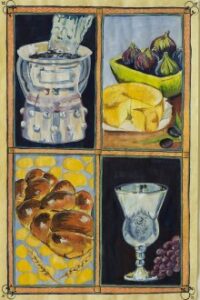
For the Summer of 2010, Rosemary Liss ’11, a Studio Art major and “alumna” of my FYS: Rituals of Dinner, and I received a Mars Faculty/Student Research Grant from Wheaton for the project “A Contemporary Illuminated English Translation of Rabbenu Bahya Ben Asher’s Jewish Eating Manual Shulhan Shel Arba.” Rosemary composed seven original illustrations for the translation.
In 2015, Ciara Sidell worked as my research assistant to help me revise and edit my book manuscript on Jewish food which was published in 2018. Also in 2015 I worked with WheaFarm students Giovanna Bishop ’17 and Evania Thompson ’18 to promote education about non-animal based whole foods and to learn fermentation and canning with the support “Get Real Get Raw” Faculty/Student collaborative grant from Wheaton. And in 2016, Biology Professor Betsey Dyer and I received an IMAGINE Grant from Wheaton for our “Fomenting and Fermenting” Faculty/Student collaborative project with Choening Dorji ’18. In 2019, Wheaton Religion Department major Anastasia Kranz ’20 and I researched and designed the course REL 235 Mental, Physical, and Spiritual Well-Being from a Comparative Religious Perspective.
Research Interests
Much of my research is focused on meals and religion. I’ve presented papers on Jewish meals for the Association for Jewish Studies and at the Brown U. Colloquium on Religions in the Ancient Mediterranean region. I have participated in numerous national conferences, such as the 15th Annual Klutznick-Harris Symposium on Food and Judaism in Omaha, NE, the international Oxford Symposium on Food and Cookery, and was on the Steering Committee of the Society of Biblical Literature research Seminar “Meals in the Greco-Roman World” from 2002-2010, and on the Steering Committee of the Folklore and Religion Seminar of the American Academy of Religion.
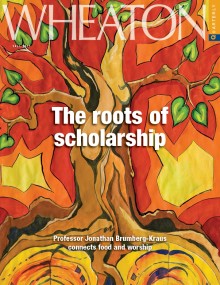
Cover art by Rosemary Liss ’11 from her illustrations for Shulhan Shel Arba
My translation of Shulhan Shel Arba, a treatise on eating by the 13th century Spanish kabbalist and Biblical exegete Rabbenu Bahya ben Asher, is available on line here. Rosemary Liss ’11 composed seven original illustrations for the translation, which can be seen here. I’m currently working on a book on the history and culture of Jewish food, that looks both at what Jewish sacred traditions prescribe about food and meals, and what Jews actually eat and think about them. In the Fall 2011 Wheaton Quarterly article “Food, God, and Scholarship,” I describe how my research and teaching on food connect. These are not just antiquarian or Jewish issues, but in fact are one set of possible answers and strategies for a basic feature of the human condition, what in his new book Michael Pollan calls The Omnivore’s Dilemma (Penguin, 2006). Given the wide range of foods we are physiologically capable of eating, we constantly have to decide what is good to eat. Thus, human beings compose and use narratives that make food, in the words of Claude Levi-Strauss, “not only good to eat, but also good to think.” How similar and how different in purpose are the Jewish medieval texts from contemporary narratives about food that we find not at the table, but in grocery stores, the stories we tell or which are implied in the labels “organic,” “halal,” “vegan,” “kosher,” or “low carb”?
Aren’t we telling stories about our food because, as Pollan says, “it gratifies some of our deepest, oldest longings, not merely for safe food, but for a connection the earth and to the handful of domesticated creatures we long depended on…to ‘engag[e] in authentic experiences’ and imaginatively enact…a ‘return to a utopian past with the positive aspects of modernity intact'”?(p.137) When R. Bahya has his readers frame the activities of the meal within the sacred drama of Adam and Eve’s fall, the revelation at Sinai, and the messianic banquet on the flesh of Leviathan,
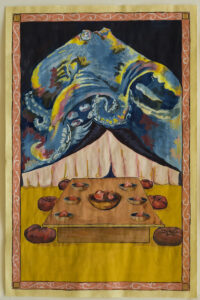
or when the Passover Haggadah’s stories and pictures evoke memories and visions of the utopian redemption from Egypt as we eat the bitter herbs and sweet haroset, or when Christian and Jewish sages counsel us to “eat the book”, to ruminate, chew on the words of God to restore our exalted status that we lost when the first man and woman sinned and ate what they mistakenly thought was good to eat – aren’t they intending something quite similar? In their own way, they are prescribing a remedy – certain kinds of reading, sometimes on an empty or full stomach, but definitely at the table – for the omnivore’s dilemma. In 2005 I participated in an NEH Summer Seminar on Religious Diversity and the Common Good, led by Boston College Professor Alan Wolfe, to gain a deeper understanding of the current American cultural situation in which I’m doing my research and teaching.
